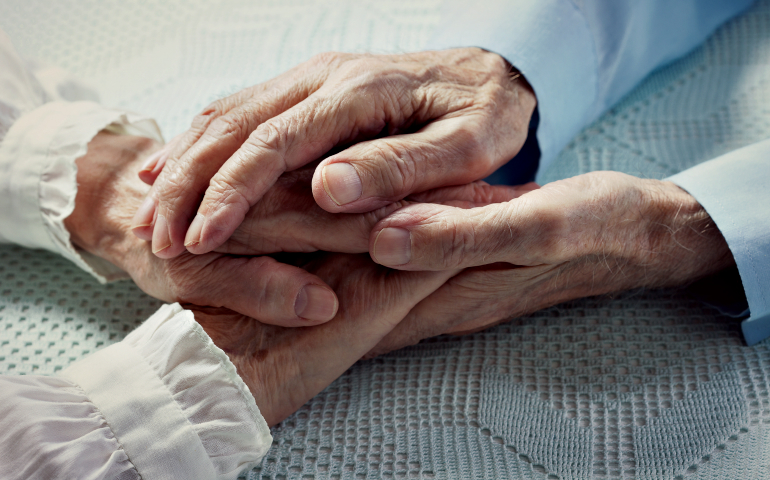
(Dreamstime/Victorrustle)
We baby boomers have also been labeled the sandwich generation, due to the fact that many of us care for children and grandchildren concurrently with our aging parents.
Since I retired from being an insurance lady a couple years ago, I have had the great good fortune to be plunk in the middle of a wonderful sandwichy situation.
Working from home has allowed me to not have to pay someone else for adult day care for our son Nick, who is 28 and has autism. It availed me to provide day care for our youngest grandchild, Mary, who turns 2 this month. And it has enabled us to check in on my husband Dan's dad, Fred, and stepmom, Jeanne, more frequently. Both 92, they are still living in their own home, a four-hour drive from ours.
Now, nothing reminds your bones that they are old like spending two days each week with a toddler. Hanging with Mary is the whole package: encompassing, exhilarating and exhausting.
At least once every evening after I have delivered Mary back to her parents, I find myself saying, over a well-deserved glass of wine: "This is why we have our kids in our 20s!"
Not only is Mary a monkey — hell-bent on zooming up and down the two flights of stairs in our three-story home, holding out one hand and yelling, "Self!" when I extend my pinky finger to steady her — but she is endlessly frustrated with how dense I am.
Like most kids, Mary is supremely sure of herself, so she is royally infuriated when I don't instantly understand what she is trying to tell me. She folds her arms and rolls her big blue eyes with mock patience. "Nonna," she repeats a little slower for my aged benefit, "dabbies!"
After much pantomiming and pointing at various choices in the kitchen, it turns out that "dabbies" are strawberries. Duh, Nonna. How obvious was that? Get with the program.
Mary's full-body sigh of relief each time she is able to make herself understood and her alternative tighter and tighter knots of frustration when she cannot are telling.
Being able to communicate is such a basic need for all of us.
When we were visiting with Dan's folks last week, it was clear that Jeanne is no longer able to do that. In her bright eyes, we watch as thoughts flicker to life in her brain, but then fall away somewhere on the path to her mouth. She simply has lost her words, and her body language telegraphs deep frustration and helplessness.
Her husband for 45 years, Fred is now her primary caregiver and translator. Watching him ask her questions and assess her needs by the signals only he can see, I was instantly reminded of taking care of Mary.
Just like a parent or grandparent ascertaining what is going on with a baby using the unspoken checklist — Are you hungry? Are you wet or poopy? Are you tired? Are you teething? Does something hurt? — Fred is caring for Jeanne in a new frontier in their marriage, a space without words.
And his respect for and attention to her are both heartwarming and heartbreaking.
Like many couples, one of their longtime routines has been to share a drink before dinner, to pour a bit of scotch into two highball glasses, and decompress and share details of their workdays.
In that well-worn groove, Fred still poured a couple fingers of golden liquid over some ice cubes for himself, then walked over to Jeanne in the armchair from which she barely moves. He leaned in, kissed her on the lips, and said, "Cheers."
She did not say "Cheers" back. There was no clinking of glasses. But the moment hung in the air, tinkling echoes from a lifetime of repetition and comfort. A unity. A partnership. We are in this together, honey. We are still here.
When we gathered around the table to eat the fried chicken dinner we brought, Fred started telling stories we had not heard before, about trips they took long ago. As he talked, Jeanne watched his mouth moving, rapt.
Pausing mid-sentence, he said to us, "See? She remembers."
Amid each story he told — about their cruise to Japan, their monthlong tour of China, their six-week roadtrip around the perimeter of the U.S. — her eyes flickered slightly and her chin nodded almost imperceptibly to us, but those small movements spoke volumes to him.
"See?" he smiled. "She remembers."
They are in this together. They are still here.
But once Jeanne was settled back in her chair, Fred turned tired eyes to us. He was nearing the end of his energy, he confided. It was clear that this admission cost him a lot.
He said that he was finally ready to allow the caregiver whose current schedule was a couple hours, two days each week, to start coming for four hours, five days a week.
Much like the parent of a night-wandering, diaper-shedding toddler, he was sleep-deprived and just plain worn out. For Fred, asking for more help with Jeanne clearly felt to him like a betrayal of their intimacy, his failure as her husband.
Through misty eyes, Dan and I rushed to assure him that was the furthest thing from the truth. That he was our hero. Her champion. And that if he didn't take care of himself, how could he possibly continue to take care of her?
If Fred took any comfort from our words, it seemed to be slight.
As we drove home, I pondered that while there are clear similarities, caring for a toddler is way easier. Every week, Mary's language improves in leaps and bounds. Her words are clearer, she strings them together into basic sentences, and as her communication grows, so does her independence. Hearing her own voice helps Mary create herself, day by day.
The opposite is true for Jeanne; as her words trail away, so do the remnants of her personhood. What is left in the silence, in the place of caring for her body, her skin, her comfort, is only love.
[Amy Morris-Young graduated from and taught writing at Loyola Marymount University in Los Angeles.]




